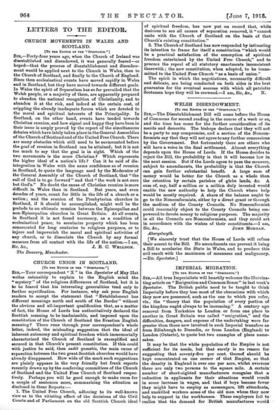WELSH DISENDOWMENT.
[To THE EDITOR OF THE " SPECTATOR."] Sir.,—Tbe Disestablishment Bill will come before the House of Commons for second reading in the course of a week or so, and the time has come for the further consideration of its merits and demerits. The bishops declare that they will not be a party to any compromise, and a section of the Noncon- formists say that they will not agree to any further concessions by the Government. But fortunately there are others who will have a voice in the final settlement. Almost everything depends upon the House of Lords. If the House decides to reject the Bill, the probability is that it will become law in the next session. But if the Lords agree to pass the measure, subject to amendments, the probability is that the Church can gain further substantial benefit. A large sum of money would be better for the Church as a whole than the retention by certain parishes of glebe lands, &c. A sum of, say, half a million or a millicn duly invested would enable the new authority to help the Church where help would be mostly required. A share of the balance ought to go to the Nonconformists, either by a direct grant or through the medium of the County Councils. No Nonconformist could reasonably object to the County Councils being em- powered to devote money to religious purposes. The majority in all the Councils are Nonconformists, and they could act in accordance with the wishes of their constituents.—I am,
[We sincerely trust that the House of Lords will refuse their assent to the Bill. No amendments can prevent it being a Bill to secularize the State in Wales, and to produce this evil result with the maximum of meanness and malignancy. —ED. Spectator.]














































 Previous page
Previous page